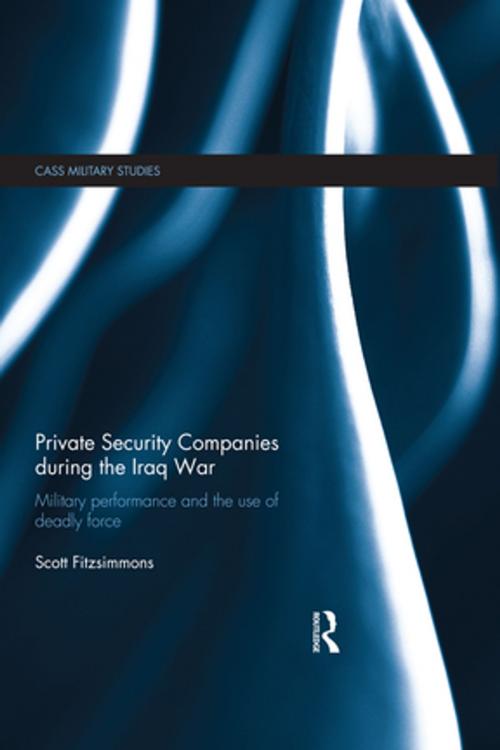Private Security Companies during the Iraq War
Military Performance and the Use of Deadly Force
Nonfiction, Social & Cultural Studies, Political Science, International, International Security, History, Military| Author: | Scott Fitzsimmons | ISBN: | 9781317541707 |
| Publisher: | Taylor and Francis | Publication: | July 16, 2015 |
| Imprint: | Routledge | Language: | English |
| Author: | Scott Fitzsimmons |
| ISBN: | 9781317541707 |
| Publisher: | Taylor and Francis |
| Publication: | July 16, 2015 |
| Imprint: | Routledge |
| Language: | English |
This book explores the use of deadly force by private security companies during the Iraq War.
The work focuses on and compares the activities of the US companies Blackwater and Dyncorp. Despite sharing several important characteristics, such as working for the same client (the US State Department) during the same time period, the employees of Blackwater fired their weapons far more often, and killed and seriously injured far more people in Iraq than their counterparts in DynCorp. In order to explain this disparity, the book undertakes the most comprehensive analysis ever attempted on the use of violence by the employees of these firms. Based on extensive empirical research, it offers a credible explanation for this difference: Blackwater maintained a relatively bellicose military culture that placed strong emphasis on norms encouraging its personnel to exercise personal initiative, proactive use of force, and an exclusive approach to security, which, together, motivated its personnel to use violence quite freely against anyone they suspected of posing a threat. Specifically, Blackwater’s military culture motivated its personnel to fire upon suspected threats more quickly, at greater distances, and with a greater quantity of bullets, and to more readily abandon the people they shot at when compared to DynCorp’s personnel, who maintained a military culture that encouraged far less violent behaviour. Utilizing the Private Security Company Violent Incident Dataset (PSCVID), created by the author in 2012, the book draws upon data on hundreds of violent incidents involving private security personnel in Iraq to identify trends in the behaviour exhibited by the employees of different firms. Based on this rich and original empirical data, the book provides the definitive study of contemporary private security personnel in the Iraq War.
This book will be of much interest to students of the Iraq War, Private Security Companies, Military Studies, War and Conflict Studies and IR in general.
This book explores the use of deadly force by private security companies during the Iraq War.
The work focuses on and compares the activities of the US companies Blackwater and Dyncorp. Despite sharing several important characteristics, such as working for the same client (the US State Department) during the same time period, the employees of Blackwater fired their weapons far more often, and killed and seriously injured far more people in Iraq than their counterparts in DynCorp. In order to explain this disparity, the book undertakes the most comprehensive analysis ever attempted on the use of violence by the employees of these firms. Based on extensive empirical research, it offers a credible explanation for this difference: Blackwater maintained a relatively bellicose military culture that placed strong emphasis on norms encouraging its personnel to exercise personal initiative, proactive use of force, and an exclusive approach to security, which, together, motivated its personnel to use violence quite freely against anyone they suspected of posing a threat. Specifically, Blackwater’s military culture motivated its personnel to fire upon suspected threats more quickly, at greater distances, and with a greater quantity of bullets, and to more readily abandon the people they shot at when compared to DynCorp’s personnel, who maintained a military culture that encouraged far less violent behaviour. Utilizing the Private Security Company Violent Incident Dataset (PSCVID), created by the author in 2012, the book draws upon data on hundreds of violent incidents involving private security personnel in Iraq to identify trends in the behaviour exhibited by the employees of different firms. Based on this rich and original empirical data, the book provides the definitive study of contemporary private security personnel in the Iraq War.
This book will be of much interest to students of the Iraq War, Private Security Companies, Military Studies, War and Conflict Studies and IR in general.















